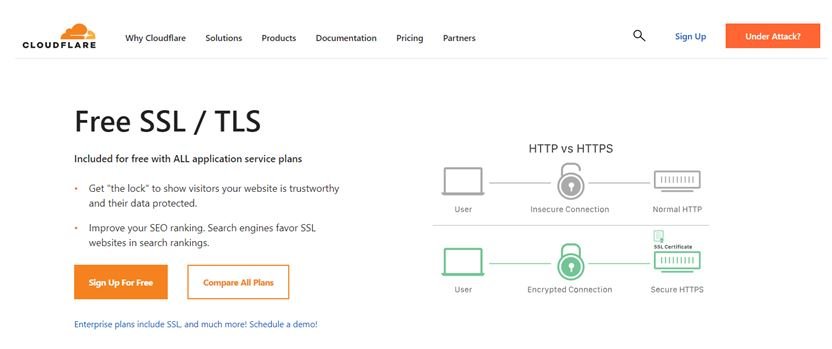One of the best ways to spread the word about your business is to create a website. It helps build a business’s online presence, boost brand awareness, and expand digital marketing opportunities.
If this is your first time creating a website, we understand the challenge of choosing the right web hosting service. For that, reviewing some of the best web hosting options is crucial as it will help you get the best environment for your new website to grow.
This article will review eight factors to consider when choosing a web host. By understanding the key aspects of web hosting, it will be easier to select a service that suits your project’s needs.
1. Uptime Guarantee
Uptime refers to the total duration a website is fully available online. It relates closely to server reliability, which is why it’s also called server uptime. Going with a web host that offers excellent uptime scores is important. Here are some reasons why:
- Increased revenue. Unlike brick and mortar shops, eCommerce stores rely heavily on excellent server uptime. During a website outage, potential customers won’t be able to access your online store and proceed to checkout. Therefore, high uptime scores are crucial to prevent revenue loss.
- Better user experience. Frequent downtime can compromise user satisfaction, leading to a tarnished brand reputation.
- Boost SEO ranking. Excellent uptime contributes to a good search engine optimization (SEO) score. Since extended downtime can harm your SEO efforts, website owners should maintain high availability to ensure their website’s growth.
As uptime is a server-side issue, opting for a web hosting service with an uptime guarantee should be every site owner’s priority. Without a reliable server, any efforts to improve the website’s performance won’t bring optimal results.
Known as the five-nines availability, 99.999% is outstanding server uptime. That percentage amounts to approximately just over five minutes of downtime a year.
The ITIC’s 2020 Reliability Report reveals that 87% of respondents consider 99.99% uptime to be the minimum acceptable reliability level for critical servers and apps. However, standard websites can manage 99.9% uptime, which is the average that most web hosts provide.
2. Pricing
When it comes to pricing, choosing an expensive web hosting plan isn’t always the best decision. To find a reliable long-term solution, you’ll need to consider the costs alongside the included features and resources.
Deciding on the right web hosting service relies heavily on the site’s hosting requirements. To estimate the general website hosting cost, here are some reasonable price ranges for different web hosting types:
- Shared hosting. It’s the most affordable hosting solution. Shared hosting plans’ price range falls between £0.99 and £3.99/month.
- VPS hosting. This hosting solution is perfect for online stores due to its flexibility. The price range for virtual private server (VPS) hosting plans is £3.95 to £57.99/month.
- Cloud hosting. This beginner-friendly hosting type is perfect for online stores and websites receiving higher traffic. Cloud hosting plans’ prices range from £7.99 to £69.99/month.
- Dedicated hosting. The most powerful hosting solution costs anywhere between £28 to upwards of £112/month.
On top of the sign-up costs, website owners should also check the web host’s renewal prices as many web hosting companies set different rates for this. A good rule of thumb is to go with a web hosting provider offering reasonable price increases, which shouldn’t exceed double the initial cost. There is also the option to first try out a free hosting. If this is something you want to look into, click here.
3. Security and Backup Policies
The right web host will provide robust security to protect your website from cyberattacks and offer a website backup option to save a copy of your site’s data.
A good web hosting service should, at the least, offer firewall protection. This feature checks incoming and outgoing traffic, verifies data, and blocks potentially malicious traffic.
Apart from firewalls, excellent web hosts offer extra security features like network monitoring services, DDoS protection, and regular malware scans. On top of that, a web hosting provider must ensure a secure data center for its customers.
In terms of backup policies, automatic site backups are a convenient feature as this will guarantee that your data can be restored in case of an incident. However, if a web host only provides manual backups, check if the process is easy to follow and not time-consuming.
4. Storage and Bandwidth
Storage refers to the amount of server space available to store a site’s data. On the other hand, bandwidth is the maximum amount of data that can be transmitted between a website, the server, and visitors.
To ensure stellar performance, website owners should opt for a web host offering a solid-state drive (SSD) storage option. This is because SSDs use flash-based memory, which is much faster than a hard disk drive.
In terms of storage size, a three to five GB SSD should be enough to accommodate a new website with standard text and image content. Opt for larger storage space if your website contains lots of video content or uses code-heavy web design.

Regarding bandwidth, the higher the website traffic, the larger the bandwidth it needs. For example, a website with 100 page loads/day may only need approximately 6 GB bandwidth/month. However, a website with 5,000 visits/day may require around 50 GB bandwidth/month.
Some web hosts offer unlimited bandwidth with premium plans. In most cases, unlimited bandwidth means that website owners can use their server’s full bandwidth, as long as it’s within the range that the web hosting company provides.
5. Server Locations
Server locations play a crucial role in ensuring fast web page load time. A server located close to the website’s target audience can minimize latency issues. For that reason, check if a web host has servers worldwide and ensure it has one in your targeted region.
In addition, website owners should check if a web hosting provider offers a Content Delivery Network (CDN). A CDN is a set of interconnected, geographically distributed servers that helps speed up page load time. With a CDN, website owners can rest assured that their site performs well no matter where the visitors are.
6. Scalability

Scalable hosting enables website owners to upgrade their server resources such as bandwidth, disk space, and CPU power when needed. Scalability is a crucial web hosting factor to consider because it can support long-term website growth.
In terms of web hosting types, cloud hosting is the most scalable solution, followed by VPS hosting. For websites on shared hosting, site owners can upgrade to the next level shared hosting plan to expand their server resources.
On the other hand, website owners with dedicated hosting plans can worry less about scalability as a dedicated server offers immense power. As a result, these websites generally take more time to reach the server resource limits.
That said, a dedicated hosting plan comes at premium prices. It’s also more suitable for bigger or enterprise-level projects, such as streaming services, large eCommerce sites, and web applications.
7. Customer Support

No matter how sophisticated a web hosting company is, server-side problems are inevitable. Website owners may need assistance after an outage or during a traffic spike.
Apart from that, first-time site owners may encounter problems they don’t know how to solve. These often relate to difficulties navigating the web hosting control panel, HTTP status codes, and file management.
To help solve website issues, site owners need knowledgeable customer support. Here are several support channels that reliable web hosting providers should offer:
- Email ticketing. This requires website owners to submit a form containing information about their problem. The web host will then register the ticket and pass it to the customer support team.
- Live chat. This system offers real-time, back-and-forth communication with a customer support agent. It’s timely and saves a full transcript for future reference. Live chat is one of the best support tools to look for in a web hosting provider.
- Phone support. For a more urgent situation, having direct verbal communication access to a customer support agent is preferable. However, many web hosts often limit phone support to premium customers due to the cost.
- Knowledge base. This is a self-learning online repository. A knowledge base helps website owners solve their issues independently. It’s time-efficient and helps reduce reliance on customer support.
8. Additional Features
To boost their competitive advantage, many web hosting providers pack additional features into their plans. These features often include free domain registration and a free secure sockets layer (SSL) certificate.
Free domain registration can help website owners save around £12/year. On a side note, a web host may only provide free domain registration for the first year. Therefore, be sure to check if your potential provider offers this feature and review their domain renewal policies.
An SSL certificate encrypts data transfer from a client to a web server and vice versa. This is a crucial security feature for online stores, as it helps secure sensitive information like passwords, credit card numbers, and addresses.

An SSL certificate can cost between £177 and £1,000/year. So, check if your chosen web hosting provider packs a free SSL certificate in its plans.
Conclusion
Throughout this article, you’ve learned eight factors to consider for choosing the right web hosting company. Let’s have a quick recap:
- Uptime guarantees. A 99.99% uptime guarantee is the minimum acceptable reliability level for crucial servers and applications.
- Pricing. Consider your site’s hosting requirements and the provider’s features to get the best value for money. Also, choose a web host offering reasonable sign-up and renewal prices.
- Security and backup policies. An excellent web host provides firewalls, network monitoring services, DDoS protection, login security, regular malware scans, secure data centers, and automatic website backups.
- Storage and bandwidth. For a fast loading time, choose SSD over a hard disk drive. In terms of bandwidth, consider the expected website traffic to ensure smooth performance.
- Server locations. Choose a hosting provider with server locations near your target audience to reduce latency.
- Scalability. Cloud and VPS hosting solutions are the most scalable, making them perfect for fast-growing business websites.
- Customer support. Find web hosting companies that provide multiple support channels, such as via email, live chat, phone, and a comprehensive knowledge base.
- Additional features. Save money by checking if a web host provides freebies, like free domain registration and SSL certificates.
We hope this article can help you find the best web hosting service for your website. Good luck!


![Read more about the article What Is It & How Does It Work [AzureWave]](https://wuschools.com/wp-content/uploads/2021/09/What-Is-It-How-Does-It-Work-AzureWave-300x169.jpg)

